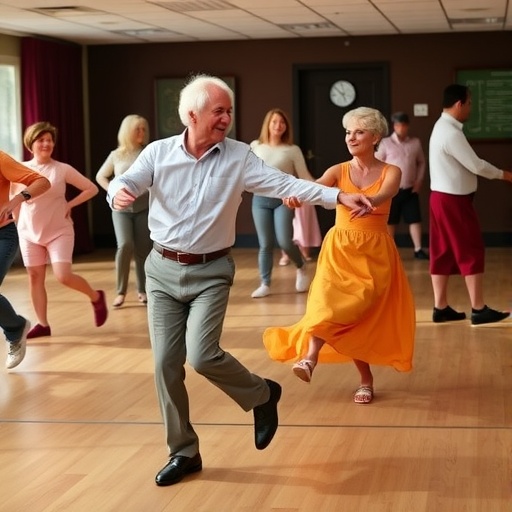Dance has long been celebrated as a vibrant form of expression, a captivating art form, and a social activity that brings people together. However, recent research suggests that the benefits of dance extend far beyond the dance floor. A groundbreaking umbrella review titled “Effects of dance interventions on brain health for older adults with cognitive impairment,” published in BMC Geriatrics, has unveiled compelling evidence regarding the positive impacts of dance on the cognitive health of older adults suffering from cognitive impairments. This banner study not only illuminates the path towards better mental health in aging populations but also inspires future directions in therapeutic interventions.
As the world continues to grapple with the increasing prevalence of cognitive impairments among older adults, the urgent need for effective interventions becomes more pronounced. Cognitive decline can severely affect not only an individual’s quality of life but also that of their families and caregivers. In this context, dance has emerged as an intriguing intervention, combining physical exertion with social interaction and creative expression, which are all known to be beneficial for mental health. The umbrella review brings to light a myriad of studies that collectively substantiate these claims, painting a promising picture for older adults facing cognitive challenges.
One of the highlighting aspects of the umbrella review is its comprehensive approach. By synthesizing data from multiple smaller studies, the researchers aimed to consolidate prevailing knowledge and establish a clearer understanding of how dance impacts brain health. This method allows for a richer dataset, while also enabling researchers to identify patterns and draw more robust conclusions based on the collective findings rather than isolated results. The review encompasses diverse dance styles—from ballroom to folkloric—indicating a wide array of potential benefits regardless of the dance form practiced.
Engaging in dance offers myriad cognitive benefits that are particularly pertinent to older adults. The physical activity associated with dancing increases blood flow to the brain, which enhances neuronal health and promotes neuroplasticity—the brain’s ability to adapt and reorganize itself. This biological response is critical for individuals experiencing cognitive decline. Furthermore, the complex nature of dance movements requires mental engagement and coordination, effectively acting as a form of cognitive training that can sharpen processing abilities and memory retention. These findings suggest that dance may serve a dual purpose, functioning as both a physical exercise routine and a cognitive enhancement strategy.
Moreover, the social dimension of dance cannot be overlooked. As noted in the review, participating in group dance classes fosters social interaction and reduces feelings of loneliness and isolation, which are significant risk factors for cognitive decline. Social engagement is instrumental for cognitive resilience, as it entails not only the sharing of experiences but also the opportunity to build meaningful connections. In a world where an aging population is becoming increasingly isolated, integrating social forms of exercise like dance into regular routines presents an accessible avenue for improving mental well-being.
The therapeutic implications of these findings are vast. For health professionals and caregivers, encouraging older adults to participate in dance can be an effective strategy for promoting cognitive health. The review suggests that dance programs designed specifically for this demographic could serve to both alleviate cognitive impairments and enhance emotional health, thus presenting a holistic approach to elderly care. Additionally, health policy makers might consider the incorporation of dance-based interventions in community health plans, creating supported opportunities for older adults to engage socially and physically.
Importantly, the umbrella review does not shy away from discussing the need for further research in this area. While the current findings are promising, the authors emphasize the necessity of well-designed clinical trials that further elucidate the long-term effects of dance on cognitive impairment. Such studies could focus on variables like frequency and duration of dance interventions, as well as the impact of different dance styles. As researchers delve deeper into the complexities of how dance influences brain health, new strategies can be developed that are tailored to the specific needs of older adults.
In conclusion, the review underscores that dance is much more than simply a form of art or entertainment; it serves as a vital tool for enhancing cognitive health in older adults plagued by cognitive impairment. As the research continues to evolve, the integration of dance into therapeutic practices presents a promising frontier in geriatric healthcare, yielding benefits that reach far beyond physical fitness. Incorporating dance into the lives of older adults could potentially enhance cognitive resilience, foster social connections, and improve overall quality of life, making it a compelling subject for future interdisciplinary research.
In essence, dance has the power not just to entertain but to heal, positioning itself as a significant player in the ongoing discourse surrounding cognitive health and wellness in our aging societies.
Subject of Research: Effects of dance interventions on brain health for older adults with cognitive impairment.
Article Title: Effects of dance interventions on brain health for older adults with cognitive impairment: an umbrella review.
Article References:
Prates, R.A.C.S., Kaczmarska, M., Senger, D. et al. Effects of dance interventions on brain health for older adults with cognitive impairment: an umbrella review.
BMC Geriatr 25, 846 (2025). https://doi.org/10.1186/s12877-025-06483-7
Image Credits: AI Generated
DOI: https://doi.org/10.1186/s12877-025-06483-7
Keywords: Dance, Cognitive Health, Older Adults, Cognitive Impairment, Dance Interventions, Neuroplasticity, Social Engagement.




